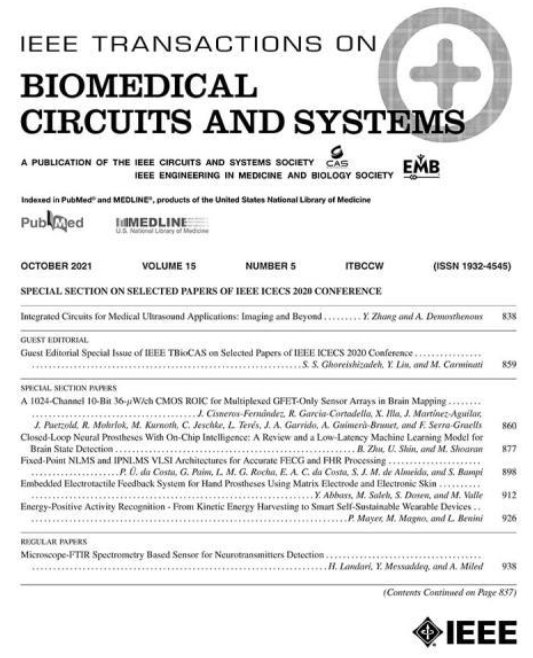A Flexible, Micro-Lens-Coupled LED Stimulator for Optical Neuromodulation.
IF 4.9
2区 医学
Q2 ENGINEERING, BIOMEDICAL
IEEE Transactions on Biomedical Circuits and Systems
Pub Date : 2016-10-01
DOI:10.1109/TBCAS.2016.2599406
引用次数: 4
Abstract
Optogenetics is a fast growing neuromodulation method, which can remotely manipulate the specific activities of genetically-targeted neural cells and associated biological behaviors with millisecond temporal precision through light illumination. Application of optogenetics in neuroscience studies has created an increased need for the development of light sources and the instruments for light delivery. This paper presents a micro-lens-coupled LED neural stimulator which includes a backside reflector and a frontside microlens for light collection and collimation. The device structure has been optimized using optical simulation and the optimized device is able to increase the volume of excitable tissues by 70.4%. Device prototypes have been fabricated and integrated based on an optimization of the device structure. The measurement results show that the light power increases by 99% at an effective penetration depth of 5 000 [Formula: see text] by the fabricated device under various voltages of 2.4-3.2 V.用于光学神经调节的柔性微透镜耦合LED刺激器。
光遗传学是一种快速发展的神经调节方法,它可以通过光照以毫秒级的时间精度远程操纵基因靶向神经细胞的特定活动和相关生物行为。光遗传学在神经科学研究中的应用增加了对光源和光传递仪器的开发需求。本文提出了一种微透镜耦合的LED神经刺激器,它包括一个背面反射镜和一个用于光收集和准直的正面微透镜。利用光学模拟对器件结构进行了优化,优化后的器件可激发组织体积增加70.4%。在优化器件结构的基础上,完成了器件原型的制作和集成。测量结果表明,在所制备的器件在2.4 ~ 3.2 V的不同电压下,当有效穿透深度为5 000时,光功率提高了99%[公式:见文]。
本文章由计算机程序翻译,如有差异,请以英文原文为准。
求助全文
约1分钟内获得全文
求助全文
来源期刊

IEEE Transactions on Biomedical Circuits and Systems
工程技术-工程:电子与电气
CiteScore
10.00
自引率
13.70%
发文量
174
审稿时长
3 months
期刊介绍:
The IEEE Transactions on Biomedical Circuits and Systems addresses areas at the crossroads of Circuits and Systems and Life Sciences. The main emphasis is on microelectronic issues in a wide range of applications found in life sciences, physical sciences and engineering. The primary goal of the journal is to bridge the unique scientific and technical activities of the Circuits and Systems Society to a wide variety of related areas such as: • Bioelectronics • Implantable and wearable electronics like cochlear and retinal prosthesis, motor control, etc. • Biotechnology sensor circuits, integrated systems, and networks • Micropower imaging technology • BioMEMS • Lab-on-chip Bio-nanotechnology • Organic Semiconductors • Biomedical Engineering • Genomics and Proteomics • Neuromorphic Engineering • Smart sensors • Low power micro- and nanoelectronics • Mixed-mode system-on-chip • Wireless technology • Gene circuits and molecular circuits • System biology • Brain science and engineering: such as neuro-informatics, neural prosthesis, cognitive engineering, brain computer interface • Healthcare: information technology for biomedical, epidemiology, and other related life science applications. General, theoretical, and application-oriented papers in the abovementioned technical areas with a Circuits and Systems perspective are encouraged to publish in TBioCAS. Of special interest are biomedical-oriented papers with a Circuits and Systems angle.
 求助内容:
求助内容: 应助结果提醒方式:
应助结果提醒方式:


